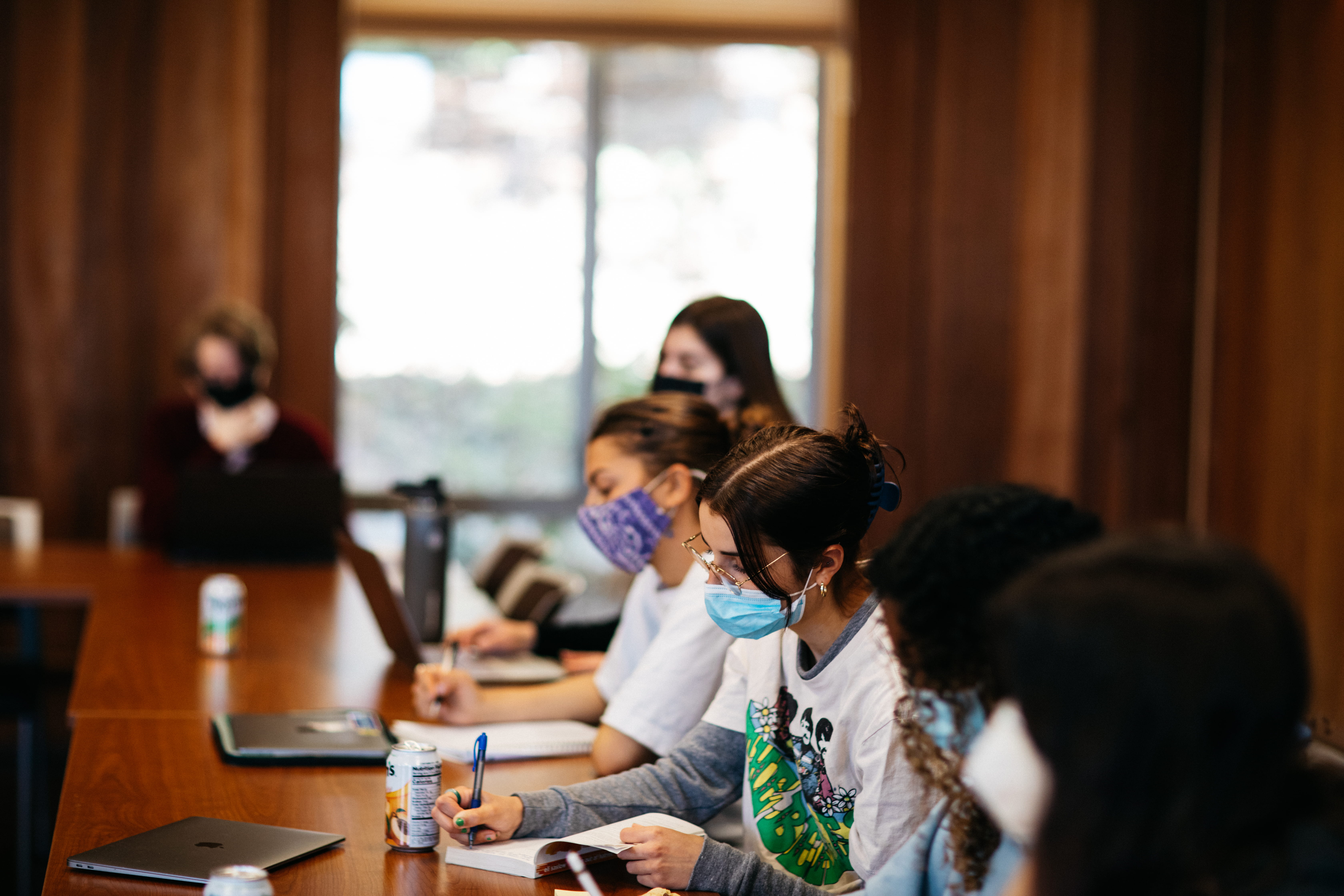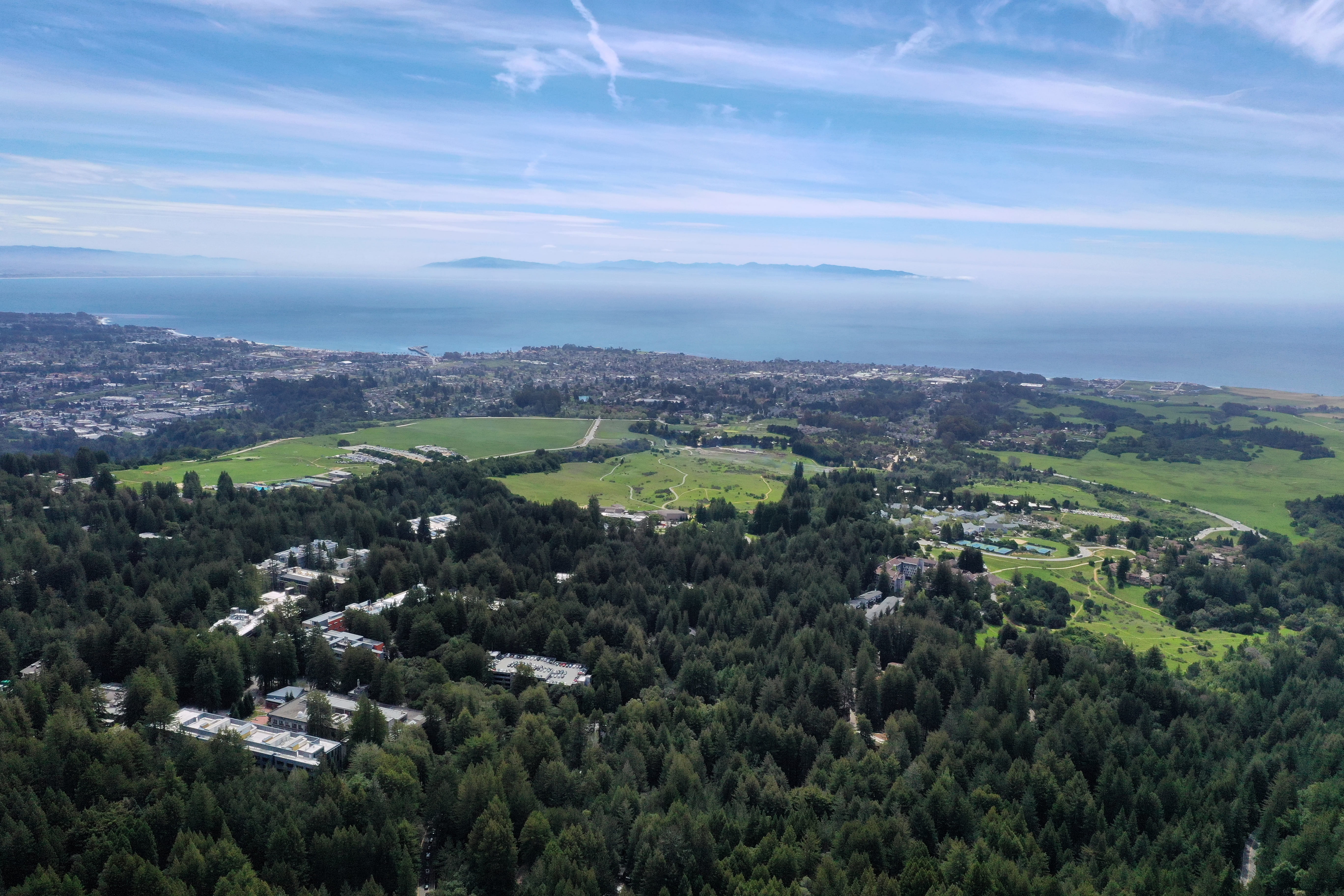
Considering applying to one of the IBSC’s programs? Interested in the research conducted by current trainees? Learn more about each of our current trainees, their research, and their training program below.
2025 IBSC Trainees
Alison Mills
IRACDA Postdoc
Mentor: William Sullivan
Project Title: Response and Adaptations of Stem Cell Divisions to Catastrophic Genomic Damage
Alison is investigating how ultrafine DNA threads that connect sister and non-sister chromatids during anaphase help preserve genomic integrity by promoting the retention of broken chromosome fragments.
Richard Dickson
IRACDA Postdoc
Mentor: Euiseok Kim
Project: The developmental origins of the neuronal circuits for higher brain functions
Richard investigates the wiring differences between feedback and feedforward neurons in the higher visual areas of the cortex. Determining the developemntal origin of these neurons.
Kevin Singewald
IRACDA Postdoc
Mentor: Glenn Millhauser
Project: Understanding of native prion protein structure autoregulation of inherent toxicity.
Researching prions, which are involved in neurodegenerative diseases; Kevin’s goal is to use EPR to understand dynamical and structural features of the prion protein.
Ale Rodriguez y Baena
IRACDA Postdoc
Mentor: Camilla Forsberg
Project: Determining the molecular regulators of age-specific megakaryopoiesis
Ale aims to determine the role of Nupr1 as a potential regulator of age-specific megakaryopoiesis; and to identify functional drivers of the age-specific megakaryopoiesis pathway by high-throughput CRISPRi screen.
Estefania Vasquez
IRACDA Postdoc
Mentor: Ali Shariati
Project: Determining molecular mechanisms linking endoreplication and differentiation in trophoblast stem cells
Estefania aims to determine the dynamics of activity and substrate network of CDK2 during TSCs endoreplication; and perform functional analysis of CDK2 substrates during TGCs development.
Anjali Misra
IRACDA Postdoc
Mentor: Upasna Sharma
Project: Investigating the molecular and biochemical function of putative methyltransferase Mettl7a1 in mouse embryonic stem cells
Anjali aims to examine the function of Mettl7a1 in embryonic stem cells and embryos; and examine methyltransferase activity and target RNAs of Mettl7a1.
Maryam Moarefian
IRACDA Postdoc
Mentor: Mircea Teodorescu
Project: Understanding the link between neurotransmitter regulation and neurodevelopmental disorders
Maryam aims to adapt an electro-taxis-on-a-chip (ETOC) 2D platform for the development of a 2D microfluidics platform to study polarization, migration directionality, and velocity of single axons; to develop a 3D platform for establishing neural circuitry from MGE to Cortex; and to develop the BEC platform to investigate the effect of excitatory and inhibitory neurotransmitter inputs and iontophoretic calcium disruption.
Conrad Fihn
IRACDA Postdoc
Mentor: Laura Sanchez
Project: Development of high-throughput mass spectrometry screening methods for assaying directed enzyme evolution mutants.
Conrad’s research focuses on developing a high-throughput mass spectrometry screening method for assaying mutants generated by directed enzyme evolution.
Ethan Older
IRACDA Postdoc
Mentor: Laura Sanchez
Project: Development of an in vitro microbe-mammalian co-culture system to study host-microbe interactions.
Ethan’s research focuses on developing an in vitro microbe-mammalian co-culture system to study host-microbe interactions, leveraging mass spectrometry imaging and multimodal imaging to visualize microbial metabolite distribution and co-localization with host targets.
Taylorlyn Stephan
CIRM Predoc (Ph.D. Student)
Mentor: Ed Green
Project: To study the genetic differences between modern humans and archaic hominins in vitro.
To better understand the evolution of human-specific neural phenotypes, Taylorlyn uses CRISPR in human iPSCs to revert neural genes that are fixed in all modern humans to the ancestral alleles, i.e. shared by Neanderthals, Denisovans and non-human primates.
Gabby Servito
CIRM Predoc (Ph.D. Student)
Mentor: Bin Chen
Project: Determining the Function of Vangl2 in Stem Cells and Differentiating Neurons in the Cerebral Cortex.
Gabby is focused on how Vangl2, a planar cell polarity protein, is involved in neural stem cell proliferation and cell fate specification in the cerebral cortex.
Jenna Myers
CIRM Predoc (Ph.D. Student)
Mentor: Camilla Forsberg
Project: Rebalancing megakaryocyte/erythroid fate decisions from aged hematopoietic stem cells (HSCs)
Jenna’s lab’s research recently discovered a direct differentiation pathway from HSCs to MkPs only in aged mice. To generate MkPs in young/middle aged mice, cells go through multiple intermediate progenitors first. Jenna’s research is focused on identifying what genetic differences lie between these two pathways, and if they can be manipulated to direct (or redirect) cell fate.
Marcel Rommel
CIRM Postdoc
Mentor: Camilla Forsberg
Project: Controlling HSC Self Renewal by the Epigenetic Landscape
Marcel aims to identify factors affecting the self renewal potential of drHSCs after transplantation; and to identify functional drivers of drHSC self renewal by epigenetic landscape manipulation.
Yanzhen Nie
CIRM Postdoc
Mentor: Bin Chen
Project: SATB2-associated syndrome
Yanzhen aims to generate mice with LOF and GOF SAS mutations to reveal consequences of SAS mutations on brain development; and to subsequently determine the impacts of increasing wild-type Satb2 expression in cortical projection neurons in Satb2+/- mice on brain development.
Mojtaba Zeraatkar
CIRM Postdoc
Mentor: Mircea Teodorescu
Project: Scalable and Programmable Microfluidic System for Enhanced Precision in Brain Organoid Culture
Mojtaba’s research focuses on developing a scalable, automated, and programmable microfluidic system for tissue culture incubators to enhance organoid culture.
Shally Saini
CIRM Predoc (Ph.D. Student)
Mentor: David Boyd
Project: Lung fibroblast subpopulation impact on the quality of tissue repair following influenza virus infection
Shally aims to determine whether distinct lung fibroblast lineages differentially regulate alveolar epithelial stem cell proliferation and differentiation at homeostasis; and determine how activation of distinct fibroblast lineages following influenza A virus (IAV) infection affects epithelial stem cell proliferation and differentiation.
Diksha Sharma
CIRM Predoc (Ph.D. Student)
Mentor: Carrie Partch
Project: Targeting a circadian transcription factor to limit proliferation of glioblastoma cancer stem cells
Diksha will aim to identify small-molecule ligands for allosteric regulation of CLOCK:BMAL1 in GSCs.
Isobel Fetter
CIRM Predoc (Ph.D. Student)
Mentor: Shaheen Sikandar
Project: Identification of novel markers o9f metastasis-initiating cells (MICs)
Isobel aims to investigate the role of LMO2-mediated DNA repair in acquiring stem-like plasticity in breast cancer; and to determine the effect of DNA repair pathways on breast cancer stem cells.
Carlismari Grundmann
CIRM Postdoc
Mentor: Laura Sanchez
Project: Investigating lipid-mediated interactions between falopian tubes organoids and omental tissues
Carlismari’s project investigates how lipid-mediated interactions, driven by β-adrenergic signaling and metabolic exchanges between iPSC-derived fallopian tube organoids and omental tissues, contribute to the metastasis of high-grade serous ovarian cancer using advanced 3D co-culture models and mass spectrometry-based lipidomics.
Carly Guiltinan
CIRM Postdoc
Mentor: Ali Shariati
Project: Stem cell fate choices during embryogenesis
Carly’s project focuses on studying cell fate decisions during human embryogenesis using stem cell-based embryo models and epigenome editing tools..
Saran Chattopadhyaya
CIRM Postdoc
Mentor: Camilla Forsberg
Project: Causes and consequences of age-specific megakaryocyte progenitors
Saran’s project investigates what causes platelet dysregulation with age as well as the consequences of platelet dysregulation on health.
Lida Langroudi
CIRM Postdoc
Mentor: Ali Shariati
Project: Decoding spatial subcellular MAPK signaling during differentiation of pluripotent stem cells
Lida’s project investigates the precise spatiotemporal control of the Mitogen-Activated Protein Kinase (MAPK) pathway which is key to regulating the self-renewal and differentiation of mouse embryonic stem cells. She is determining how the dynamics of distinct subcellular localizations of the MAPK pathway regulate its substrate network and function in pluripotent stem cells.
Eva Edelson
CIRM Predoc (Ph.D. Student)
Mentor: Michael Stone
Project: Investigating telomere biology disorders
Eva’s project aims to understand how human telomerase RNA folds, trafficks, and interacts with proteins to understand how variants of this RNA precipitate disease in patients with telomere biology disorders
Raana Mogharrab
CIRM Predoc (Ph.D. Student)
Mentor: Camilla Forsberg
Project: Investigating mechanisms of platelet production
Raana’s project aims to understand the mechanisms that regulate platelet production and hyper-reactivity upon aging, with the goal of better controlling platelet-related disorders.
Nicholas Chu
CIRM Predoc (Ph.D. Student)
Mentor: Zhu Wang
Project: Role of miR-205 in prostate epithelial homeostasis and cancer intitiation.
Nicholas’ project aims to understand the role of miR-205 in prostate epithelial homeostasis and cancer initiation.
Lyna Kabbani
T32 Postdoc
Mentor: Jeremy Sanford
Project: I3 acts as a post-transcriptional amplifier of MLL-Af4-driven leukemogenic gene expression
Lyna aims to uncover the molecular basis of I3 regulated target selection by RISC; and how I3 modulates RISC-mRNA binding and function in-vivo.
Tommy Finn
T32 Postdoc
Mentor: Bin Chen
Project: Satb2 recruits several chromatin remodeling complexes, with distinct functions, to effect epigenetic changes in relation to neuronal fate specification
Tommy aims to identify direct targets of Satb2 and the function of Satb2 regulation of promoter-enhancer interaction; and to identify the chromatin remodeling complexes which Satb2 recruits to regulate chromatin landscape and accessibility.
Greta Vargova
T32 Postdoc
Mentor: David Feldheim
Project: Investigating which auditory brainstem regions contribute to sound
Greta aims to determine how different auditory brainstem regions contribute to sound localization in the mouse superior colliculus..
Bryce Manso
T32 Postdoc
Mentor: Camilla Forsberg
Project: Investigating the role of aging and inflammation in dysregulated blood cell production
Bryce aims to determine how inflammation controls age-specific platelet production by hematopoietic stem cells.
